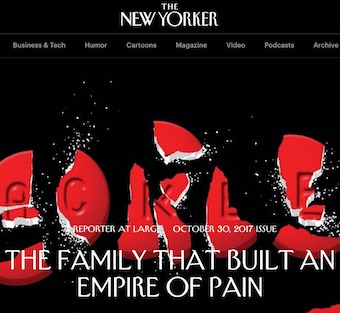Brooklyn-born brothers Arthur, Mortimer and Raymond Sackler—all physicians—represent one of America’s great philanthropic families, a group that donated millions of dollars to institutions such as Metropolitan Museum of Art, Guggenheim Museum, Harvard University, Yale, Columbia, Louvre and Oxford.
Those grateful institutions, in turn, prominently affixed the Sackler name to endowments, professorships, medical research, institutes and museum wings/galleries. For instance, The Sackler Wing houses "The Temple of Dendur," the more than 2,000-year-old sandstone monument donated by the Egyptian Government to The Met and considered one of the museum's greatest treasures.
 |
Forbes counts the Sacklers among America’s richest families with a collective worth of $13B, topping that of the Rockefellers or Mellons.
The bulk of the Sackler wealth quietly accumulated over the years from the family business, Purdue Phama—the Stamford-based company that developed prescription painkiller OxyContin, which is at the center of the opioid crisis that caused the overdose deaths of 200,000 Americans since 1999 and triggered today’s declaration of a public health emergency from President Trump.
The October 30 New Yorker chronicles the rise of Purdue Pharma from sleepy Greenwich Village maker of laxatives and earwax removers when acquired in 1952 by the Sacklers to its current position of expanding OxyContin sales into Latin America, Canada, England, China and Middle East.
Called “The Empire of Pain” and written by Patrick Radden Keefe, the powerful 13,000-word New Yorker article is a must-read for communications people.
It shows how savvy PR, advertising and marketing paved the way for the rise of OxyContin.
Keefe though considers PR’s greatest accomplishment as:
“The Sacklers have always excelled at the confidence game of marketing, and it struck me that the greatest trick they ever pulled was to write the family out of the history of the family business. I was reminded of Arthur Sackler’s admonition that you should endeavor to leave the world a better place than it was when you came into it, and I wondered about the moral arithmetic of the Sackler deeds.”
Keefe quotes Allen Frances, a Duke psychiatrist, to suggest a possible route for the Sackers to make amends to the more than two and a half million Americans who suffer from opioid disorders.
“If the Sacklers want to clear their name, they could take a very substantial fraction of that fortune and create a mechanism for providing free treatment for everyone who’s become addicted,” said Frances.
For inspiration, the Sacklers could look to Alfred Nobel, the inventor of dynamite who created the Nobel Peace Prize or the descendants of John D. Rockefeller who have funded groups tackling climate change and criticized the environmental performance of family business ExxonMobil.
But until the public becomes aware of their role in the crisis, he Sacklers will feel no pressure to do the right thing.
The New Yorker got that ball rolling.


 Trump Media & Technology Group today reported a $58.2M net loss on $4.1M in 2023 revenues, a disclosure that drove its stock price down 22.6 percent to $47.96.
Trump Media & Technology Group today reported a $58.2M net loss on $4.1M in 2023 revenues, a disclosure that drove its stock price down 22.6 percent to $47.96. Barry Pollack, an attorney at Wall Street’s Harris St. Laurent & Wechsler, has registered Julian Assange as a client with the Justice Dept. “out of an abundance of caution.”
Barry Pollack, an attorney at Wall Street’s Harris St. Laurent & Wechsler, has registered Julian Assange as a client with the Justice Dept. “out of an abundance of caution.” Paramount Global to slash 800 jobs in what chief executive Bob Bakish calls part of an effort to “return the company to earnings growth"... Rolling Stone editor-in-chief Noah Shachtman is exiting at the end of the month due to disagreements with chief executive Gus Wenner over the direction the magazine is taking... The New York Times broke the $1 billion barrier in annual revenue from digital subscriptions in 2023... Press Forward is investing more than $500 million to strengthen local newsrooms.
Paramount Global to slash 800 jobs in what chief executive Bob Bakish calls part of an effort to “return the company to earnings growth"... Rolling Stone editor-in-chief Noah Shachtman is exiting at the end of the month due to disagreements with chief executive Gus Wenner over the direction the magazine is taking... The New York Times broke the $1 billion barrier in annual revenue from digital subscriptions in 2023... Press Forward is investing more than $500 million to strengthen local newsrooms. The majority of news articles are read within the first three days of publication, according to a recent report.
The majority of news articles are read within the first three days of publication, according to a recent report. The Los Angeles Times gives pink slips to 115 people or 20 percent of its newsroom staff... TIME is also laying off about 30 employees, which is approximately 15 percent of its editorial staff... The Baltimore Banner, which was launched by Stewart Bainum in 2022 after he failed to buy the Baltimore Sun, added 500 subscribers per day in the three days following Sinclair Broadcast Group's deal to purchase the Sun.
The Los Angeles Times gives pink slips to 115 people or 20 percent of its newsroom staff... TIME is also laying off about 30 employees, which is approximately 15 percent of its editorial staff... The Baltimore Banner, which was launched by Stewart Bainum in 2022 after he failed to buy the Baltimore Sun, added 500 subscribers per day in the three days following Sinclair Broadcast Group's deal to purchase the Sun.


 Have a comment? Send it to
Have a comment? Send it to 
No comments have been submitted for this story yet.